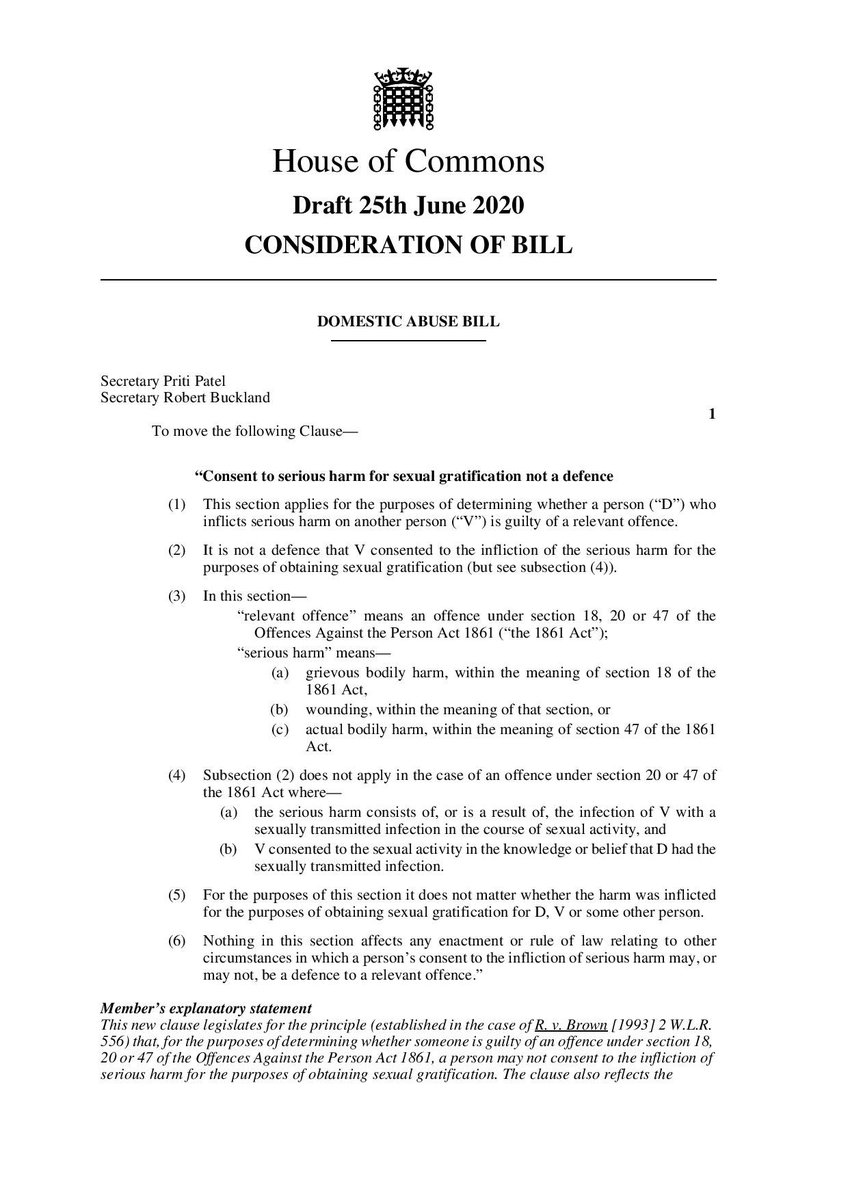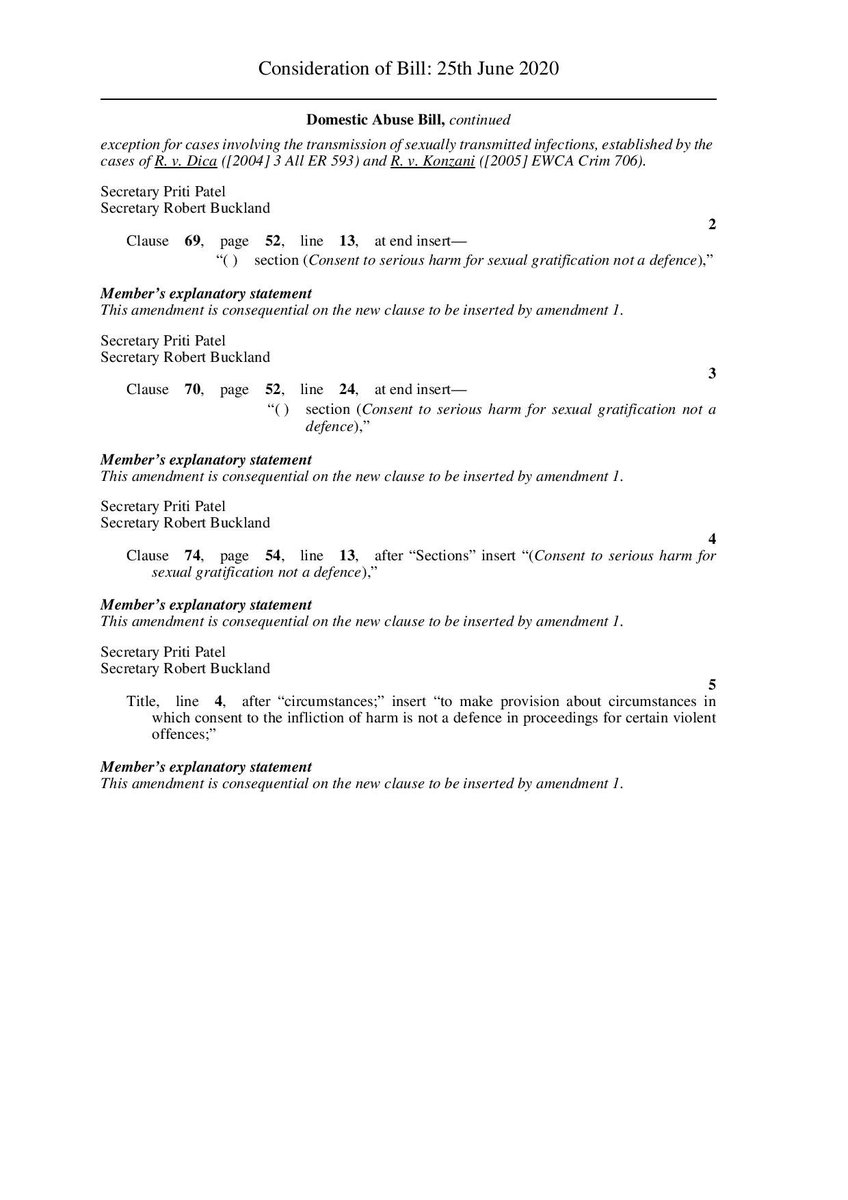There has been quite a bit of coverage today about the so-called “rough sex defence”, which the government is claiming credit for abolishing.
This is a difficult and sensitive subject, but I think it’s worth a brief [THREAD] looking at the truth behind the headlines. https://twitter.com/pritipatel/status/1278361627939819523">https://twitter.com/pritipate...
This is a difficult and sensitive subject, but I think it’s worth a brief [THREAD] looking at the truth behind the headlines. https://twitter.com/pritipatel/status/1278361627939819523">https://twitter.com/pritipate...
The first thing to note is that there isn’t actually any such thing in law as a “rough sex defence” to murder - or indeed, to any form of assault causing injury.
It is a long established principle of the common law that a person cannot legally consent to being injured or killed.
It is a long established principle of the common law that a person cannot legally consent to being injured or killed.
This has been confirmed by the Court of Appeal in several high-profile cases, most famously (for law students) the case of R v Brown in 1993. This involved the prosecution for ABH of a group of men who inflicted injury on each other during consensual sado-masochistic sex.
Put simply, saying “my victim consented” gives you no defence.
So what then is the rough sex defence? It’s a term adopted by campaigners after a series of cases in which men avoided convictions for murder after claiming that fatal injuries had been caused during consensual sex.
So what then is the rough sex defence? It’s a term adopted by campaigners after a series of cases in which men avoided convictions for murder after claiming that fatal injuries had been caused during consensual sex.
Now that probably sounds confusing. If consent is not a defence to injuring or killing, why are accused men raising “rough sex” in murder trials?
It is all to do with how the law of murder works.
It is all to do with how the law of murder works.
In order to prove murder, the prosecution have to prove that the Defendant *either* intended to kill the deceased, or intended to cause her really serious harm.
If the prosecution can’t prove that intent, they can’t prove murder.
If the prosecution can’t prove that intent, they can’t prove murder.
A common “defence” in murder cases generally, therefore, is a defendant saying “I may have intended to cause *some* harm, but I didn’t intend to kill or cause really serious harm.”
And it’s in that context that consensual rough sex can become relevant.
And it’s in that context that consensual rough sex can become relevant.
What a defendant might say is: “I know it looks from all the injuries as if I intended to cause really serious harm, but I didn’t. The context was consensual BDSM. I intended to cause pain and some injury, but not *serious* injury.”
So the defence isn’t “my victim was consenting”, but “I didn’t intend to kill or cause serious harm”. An important distinction.
Also important to note that if a jury couldn’t be sure that the defendant intended to kill/cause GBH, he would still likely be guilty of manslaughter.
Also important to note that if a jury couldn’t be sure that the defendant intended to kill/cause GBH, he would still likely be guilty of manslaughter.
The problem is that campaigners have noticed an increase in cases in which defendants are saying this. (See link) And there are concerns that it’s becoming a trope; a sort of modern-day “she walked into a door” defence exploited by violent misogynists. https://static1.squarespace.com/static/5c49b798e749409bfb9b6ef2/t/5e4da72920c08f54b94d91e4/1582147383202/WCCTT+briefing+sheet+2020+February.pdf">https://static1.squarespace.com/static/5c...
It is also unimaginably upsetting for loved ones of the deceased to have to listen while this subject is publicly dissected in court. The legal protections in place in sexual cases - anonymity and restrictions on evidence of sexual history - only apply to live complainants.
So the concern is entirely understandable. But here’s the difficulty: while, undoubtedly, unscrupulous guilty defendants will exploit this to try to avoid justice, there will also be some defendants for whom it is the truth.
Just as, on rare occasions, someone may genuinely walk into a door, there will be people engaging in BDSM who - with no intention of causing serious injury - cause the death of their partner.
And if they didn’t have that intention, they shouldn’t be convicted of murder.
And if they didn’t have that intention, they shouldn’t be convicted of murder.
This is why we can’t just say “nobody is allowed to raise that defence any more”. Because it would mean treating as murderers people who didn’t intend to kill or cause serious harm.
And that’s why, contrary to the news reports, the “defence” hasn’t been abolished at all.
And that’s why, contrary to the news reports, the “defence” hasn’t been abolished at all.
Bringing us to today’s announcement, the truth is that very little has in fact been done. If you read the Bill, you’ll see that all it does is put down in statute the common law principle that you can’t consent to being injured or killed.
But that was already the law.
But that was already the law.
Ultimately, all that has happened is that the law has been written down somewhere else. It won’t make a difference. You might hear the government claim to be “saving lives”. They won’t be. Not with this law, I’m afraid. Because, to coin a phrase, nothing has changed. Not a thing.
So what can be done?
One key part is awareness-raising, on which the campaigners have done a tremendous job. The more the public is aware of this trope, the more critical juries and prosecutors will be when assessing a defendant’s claim, and the lower the chance of hoodwinking.
One key part is awareness-raising, on which the campaigners have done a tremendous job. The more the public is aware of this trope, the more critical juries and prosecutors will be when assessing a defendant’s claim, and the lower the chance of hoodwinking.
This is an interesting post by academics including @jimifletch, considering a new offence of causing death by dangerous sexual activity, modelled on the law of causing death by dangerous driving. But this would ultimately just be relabelling manslaughter. https://www.starsdorset.org/blog/homicide-and-violence-in-sexual-activity-moving-from-defence-to-offence">https://www.starsdorset.org/blog/homi...
In the end, I can’t see that there is a great deal that the law can do. I don’t want to sound unduly pessimistic. But guilty people will always try to get away with murder. A fair and effective criminal justice system is the best way we can try to stop them succeeding.
To that end, and with full respect to campaigners who have devoted a lot of time and political capital to this cause, I’d urge caution before endorsing the govt’s Bill. It is window dressing, allowing ministers to claim to be Doing Something while in reality doing nothing at all.
To emphasise, this isn’t intended in any way to criticise or deter those trying to improve the system. Anything which limits the collateral cruelty of the adversarial system to victims and families, without adversely affecting fairness to the accused, is absolutely worthwhile.
If anybody does have any suggestions for how the law might be improved to this end, I’d be very happy to host a blogpost. This should be an opportunity to widen discussion, not close it down.
My feeling is that the answer doesn’t lie in the law, rather in social reform, education and public awareness. But I’m happy to be wrong about this.

 Read on Twitter
Read on Twitter




